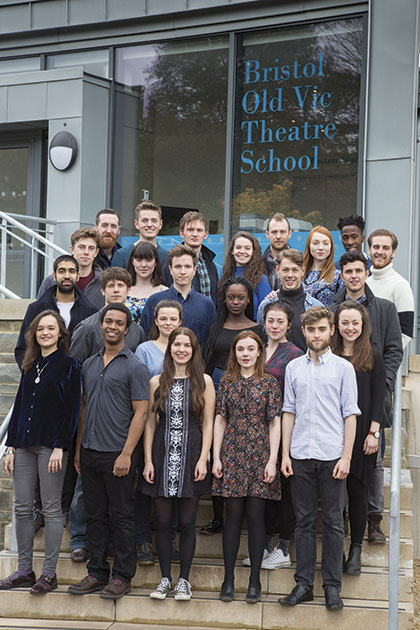SUSAN ELKIN pays a visit to the Bristol Old Vic Theatre School as part of its anniversary season to discover a thriving septuagenarian.
It’s anniversary time in Bristol. 250 years ago, in 1776, the city’s Old Vic Theatre opened, probably now Britain’s oldest surviving theatre still in business. It has a long and illustrious history including actor training since 1946, when the associated Bristol Old Vic Theatre School (BOVTS) was founded. So happy seventieth birthday, BOVTS.
At the beginning – when Stephanie Cole trained there in the late 50s for instance – the training all took place at the theatre. Over the years the school has established a separate identity for itself and functions independently. Today it is based in two large Georgian houses in Downside Road. This academic year – part of the anniversary celebrations – the school has completed its “Link Building”. It fills in the former space between the houses, provides a businesslike entrance and reception area and some fine studio and rehearsal space. “It makes a terrific difference to the feel of the place now that the main campus has become a single building” said Jenny Stephens, artistic director, when she showed me round.
The school also has studios elsewhere in the city for TV and film work and a busy, bustling site on an industrial estate where its technical theatre courses are taught.
BOVTS is the alma mater of many successful actors, including Jeremy Irons, Olivia Colman, Laura Carmichael, Daniel Day Lewis and Amanda Redman. Today it operates, along with RADA, LAMDA and five dance schools, as part of the Conservatoire of Dance and Drama. The CDD functions like a collegiate university with eight member institutions although, of course, each school has its own distinctive identity. Students at all the CDD schools are entitled to student loans and related funding exactly as if they were studying, say, history or business studies in a university.
“Our 160 students are a very diverse bunch and come from all sorts of backgrounds” says Jenny, adding that many (she shows me a photograph of students and tells me their life stories to prove her point) come from families whose income falls below £25,000 a year.
BOVTS is a much smaller school than some of its counterparts. It teaches only acting and technical theatre. There’s a two-year foundation degree and a three-year BA in acting as well as degrees in various aspects of backstage work. The school also runs a number of specialist post graduate courses. “But we don’t do musical theatre, for example, separately”, explains Jenny, “although of course many of our graduates go on to work in it very successfully because it’s taught within the acting course.”
Unlike some other drama schools, BOVTS has no theatre of its own. “And we see that as an advantage, because it means that we take student shows to every venue in the city where they play to the public”, says principal Paul Rummer, adding that his students also regularly tour shows in the West Country, which is also very good training experience because the schedules are long and exacting and the shows go to a wide range of venues from mid-size theatres to village halls. “Bristol is a culturally vibrant city and we are a key part of that, with many collaborations and partnerships” says Paul.
The flagship project for this anniversary year is a production of King Lear (18 June to 10 July) which is a fine example of how BOVTS works to the advantage of the students and everyone else involved. The show is directed by Tom Morris, artistic director at Bristol Old Vic with which the school has now re-established some links – and it will play in the old theatre.
Three crowd pulling professionals in the cast will ensure that paying audiences come in large numbers: Timothy West is playing Lear, Stephanie Cole the Fool and David Hargreaves, Gloucester. Every other role is played by a BOVTS third year student. I sat in on part of a rehearsal of a scene featuring Goneril and Edmund and it looked very promising. “The students are learning a lot from working with high calibre professionals” said Jenny Stephens. “And once term ends we shall pay the – by then – former students the fees recommended by the actors’ union, Equity, so that it becomes their first professional experience.”
Paul adds: “But it’s definitely a BOVTS production in partnership with the theatre not the other way round. The creative and technical team are a mix of our students and professionals so there’s a lot of scope for learning there too.”
All in all, there’s a lot going on then. The atmosphere is very vibrant and the work and successes exciting. Here’s to the next seventy years.



